Commerce (English Medium)
Science (English Medium)
Arts (English Medium)
Academic Year: 2015-2016
Date & Time: 5th March 2016, 10:30 am
Duration: 3h
Advertisements
A signal of 5 kHz frequency is amplitude modulated on a carrier wave of frequency 2 MHz. What are the frequencies of the side bands produced?
Chapter: [0.15] Communication Systems
What can be the causes of helical motion of a charged particle?
Chapter: [0.04] Moving Charges and Magnetism
Define mobility of a charge carrier
Chapter: [0.02] Electrostatic Potential and Capacitance
What is its relation with relaxation time?
Chapter: [0.03] Current Electricity
What is the amount of work done in moving a point charge Q around a circular arc of radius ‘r’ at the centre of which another point charge ‘q’ is located?
Chapter: [0.01] Electric Charges and Fields
Why can’t we see clearly through fog?
Chapter: [0.09] Ray Optics and Optical Instruments
Name the phenomenon responsible for it.
Chapter: [0.09] Ray Optics and Optical Instruments
When is Hα line in the emission spectrum of hydrogen atom obtained? Calculate the frequency of the photon emitted during this transition.
Chapter: [0.12] Atoms
Calculate the wavelength of radiation emitted when electron in a hydrogen atom jumps from n = `oo` to n = 1.
Chapter: [0.11] Dual Nature of Radiation and Matter
When 5 V potential difference is applied across a wire of length 0.1 m, the drift speed of electrons is 2.5 x 10-4 m/s. If the electron density in the wire is 8 x 1028 m-3, calculate the resistivity of the material of the wire.
Chapter: [0.03] Current Electricity
A proton and an α -particle are accelerated through the same potential difference. Which one of the two has greater de-Broglie wavelength Justify your answer.
Chapter: [0.11] Dual Nature of Radiation and Matter
A proton and an α-particle are accelerated through the same potential difference. Which one of the two has less kinetic energy? Justify your answer.
Chapter: [0.11] Dual Nature of Radiation and Matter
A ray PQ incident on the refracting face BA is refracted in the prism BAC as shown in the figure and emerges from the other refracting face AC as RS such that AQ = AR. If the angle of prism A = 60° and refractive index of material of prism is `sqrt3 `. Calculate angle θ.
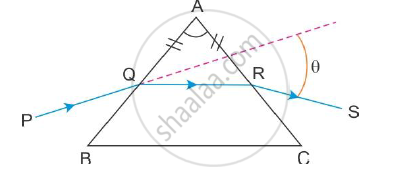
Chapter: [0.09] Ray Optics and Optical Instruments
Why is base band signal not transmitted directly? Give any two reasons
Chapter: [0.15] Communication Systems
A screen is placed at a distance of 100 cm from an object. The image of the object is formed on the screen by a convex lens for two different locations of the lens separated by 20 cm. Calculate the focal length of the lens used.
Chapter:
A converging lens is kept coaxially in contact with a diverging lens – both the lenses being of equal focal length. What is the focal length of the combination?
Chapter: [0.09] Ray Optics and Optical Instruments
Advertisements
Derive the mathematical expression for law of radioactive decay for a sample of a radioactive nucleus
Chapter: [0.13] Nuclei
How is the mean life of a given radioactive nucleus related to the decay constant?
Chapter: [0.13] Nuclei
What is space wave propagation?
Chapter: [0.15] Communication Systems
State the factors which limit its range of propagation
Chapter: [0.15] Communication Systems
Derive an expression for the maximum line of sight distance between two antennas for space wave propagation.
Chapter: [0.15] Communication Systems
Distinguish between a conductor and a semi conductor on the basis of energy band diagram
Chapter: [0.14] Semiconductor Electronics - Materials, Devices and Simple Circuits
The following figure shows the input waveforms (A, B) and the output waveform (Y) of a gate. Identify the gate, write its truth table and draw its logic symbol.
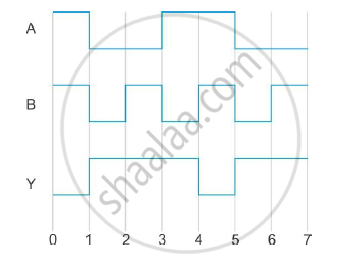
Chapter: [0.14] Semiconductor Electronics - Materials, Devices and Simple Circuits
Write the two processes that take place in the formation of a p-n junction.
Chapter: [0.14] Semiconductor Electronics - Materials, Devices and Simple Circuits
Draw the circuit diagram of a full wave rectifier. Explain its working showing its input and output waveforms.
Chapter: [0.14] Semiconductor Electronics - Materials, Devices and Simple Circuits
Briefly explain how the output voltage/current is unidirectional.
Chapter: [0.14] Semiconductor Electronics - Materials, Devices and Simple Circuits
State two important properties of photon which are used to write Einstein’s photoelectric equation.
Chapter: [0.11] Dual Nature of Radiation and Matter
Define (i) stopping potential and (ii) threshold frequency, using Einstein’s equation and drawing necessary plot between relevant quantities.
Chapter: [0.11] Dual Nature of Radiation and Matter
Derive Snell’s law on the basis of Huygen’s wave theory when the light is travelling from a denser to a rarer medium.
Chapter: [0.09] Ray Optics and Optical Instruments
Draw the sketches to differentiate between plane wavefront and spherical wavefront.
Chapter: [0.1] Wave Optics
How are electromagnetic waves produced?
Chapter: [0.08] Electromagnetic Waves
What is the source of energy of electromagnetic waves?
Chapter: [0.08] Electromagnetic Waves
Write mathematical expressions for electric and magnetic fields of an electromagnetic wave propagating along the z-axis.
Chapter: [0.08] Electromagnetic Waves
Write any two important properties of electromagnetic waves.
Chapter: [0.08] Electromagnetic Waves
When an AC source is connected to an ideal capacitor, show that the average power supplied by the source over a complete cycle is zero
Chapter: [0.02] Electrostatic Potential and Capacitance
Advertisements
A bulb is connected in series with a variable capacitor and an AC source as shown. What happens to the brightness of the bulb when the key is plugged in and capacitance of the capacitor is gradually reduced?
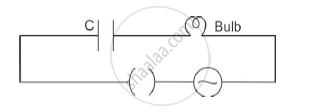
Chapter: [0.02] Electrostatic Potential and Capacitance
State Ampere’s circuital law.
Chapter: [0.04] Moving Charges and Magnetism
Use this law to find magnetic field due to straight infinite current carrying wire.
Chapter: [0.04] Moving Charges and Magnetism
How are the magnetic field lines different from the electrostatic field lines?
Chapter: [0.05] Magnetism and Matter
State the principle of a cyclotron.
Chapter: [0.04] Moving Charges and Magnetism
Show that the time period of revolution of particles in a cyclotron is independent of their speeds. Why is this property necessary for the operation of a cyclotron?
Chapter: [0.04] Moving Charges and Magnetism
Two identical cells of emf 1.5 V each joined in parallel, supply energy to an external circuit consisting of two resistances of 7 Ω each joined in parallel. A very high resistance voltmeter reads the terminal voltage of cells to be 1.4 V. Calculate the internal resistance of each cell.
Chapter: [0.03] Current Electricity
Find the electric field intensity due to a uniformly charged spherical shell at a point (i) outside the shell. Plot the graph of electric field with distance from the centre of the shell.
Chapter: [0.01] Electric Charges and Fields
Find the electric field intensity due to a uniformly charged spherical shell at a point (ii) inside the shell. Plot the graph of electric field with distance from the centre of the shell.
Chapter: [0.01] Electric Charges and Fields
Seema’s uncle was advised by his doctor to have an MRI (Magnetic Resonance Imaging) scan of his brain. Her uncle felt it to be expensive and wanted to postpone it. When Seema learnt about this, she took the help of her family and also approached the doctor, who also offered a substantial discount. She then convinced her uncle to undergo the test to enable the doctor to know the condition of his brain. The information thus obtained greatly helped the doctor to treat him properly.
Based on the above paragraph, answer the following questions:
(a) What according to you are the values displayed by Seema, her family and the doctor?
(b) What could be the possible reason for MRI test to be so expensive?
(c) Assuming that MRI test was performed using a magnetic field of 0.1 T, find the minimum and maximum values of the force that the magnetic field could exert on a proton (charge = 1.6 x 10-19 C) moving with a speed of 104 m/s.
Chapter: [0.04] Moving Charges and Magnetism
When a bar magnet is pushed towards (or away) from the coil connected to a galvanometer, the pointer in the galvanometer deflects. Identify the phenomenon causing this deflection and write the factors on which the amount and direction of the deflection depends. State the laws describing this phenomenon.
Chapter: [0.06] Electromagnetic Induction
Sketch the change in flux, emf and force when a conducting rod PQ of resistance R and length l moves freely to and fro between A and C with speed v on a rectangular conductor placed in uniform magnetic field as shown in the figure
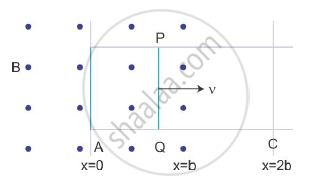
Chapter: [0.04] Moving Charges and Magnetism
In a series LCR circuit connected to an a.c. source of voltage v = vmsinωt, use phasor diagram to derive an expression for the current in the circuit. Hence, obtain the expression for the power dissipated in the circuit. Show that power dissipated at resonance is maximum
Chapter: [0.07] Alternating Current
Why does unpolarised light from a source show a variation in intensity when viewed through a polaroid which is rotated?
Chapter: [0.09] Ray Optics and Optical Instruments
Show with the help of a diagram, how unpolarised light from Sun gets linearly polarised by scattering.
Chapter: [0.09] Ray Optics and Optical Instruments
Three identical polaroid sheets P1, P2 and P3 are oriented so that the pass axis of P2 and P3 are inclined at angles of 60° and 90° respectively with the pass axis of P1. A monochromatic source S of unpolarised light of intensity I0 is kept in front of the polaroid sheet P1 as shown in the figure. Determine the intensities of light as observed by the observer at O, when polaroid P3 is rotated with respect to P2 at angles θ = 30° and 60°.
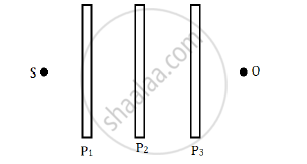
Chapter: [0.1] Wave Optics
Derive an expression for path difference in Young’s double slit experiment and obtain the conditions for constructive and destructive interference at a point on the screen.
Chapter: [0.1] Wave Optics
The intensity at the central maxima in Young’s double slit experiment is I0. Find out the intensity at a point where the path difference is` lambda/6,lambda/4 and lambda/3.`
Chapter: [0.1] Wave Optics
Distinguish with the help of a suitable diagram, the difference in the behaviour of a conductor and a dielectric placed in an external electric field.
Chapter: [0.02] Electrostatic Potential and Capacitance
A capacitor of capacitance C is charged fully by connecting it to a battery of emf E. It is then disconnected from the battery. If the separation between the plates of the capacitor is now doubled, how will the following change?
(i) charge stored by the capacitor.
(ii) Field strength between the plates.
(iii) Energy stored by the capacitor.
Justify your answer in each case.
Chapter: [0.02] Electrostatic Potential and Capacitance
How does polarised dielectric modify the original external field?
Chapter: [0.02] Electrostatic Potential and Capacitance
Explain why, for a charge configuration, the equipotential surface through a point is normal to the electric field at that point
Chapter: [0.01] Electric Charges and Fields
Draw a sketch of equipotential surfaces due to a single charge (-q), depicting the electric field lines due to the charge
Chapter: [0.02] Electrostatic Potential and Capacitance
Obtain an expression for the work done to dissociate the system of three charges placed at the vertices of an equilateral triangle of side ‘a’ as shown below.
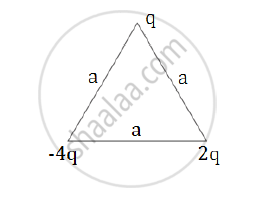
Chapter: [0.01] Electric Charges and Fields
Other Solutions
Submit Question Paper
Help us maintain new question papers on Shaalaa.com, so we can continue to help studentsonly jpg, png and pdf files
CBSE previous year question papers Class 12 Physics with solutions 2015 - 2016
Previous year Question paper for CBSE Class 12 Physics-2016 is solved by experts. Solved question papers gives you the chance to check yourself after your mock test.
By referring the question paper Solutions for Physics, you can scale your preparation level and work on your weak areas. It will also help the candidates in developing the time-management skills. Practice makes perfect, and there is no better way to practice than to attempt previous year question paper solutions of CBSE Class 12.
How CBSE Class 12 Question Paper solutions Help Students ?
• Question paper solutions for Physics will helps students to prepare for exam.
• Question paper with answer will boost students confidence in exam time and also give you an idea About the important questions and topics to be prepared for the board exam.
• For finding solution of question papers no need to refer so multiple sources like textbook or guides.
